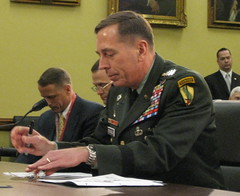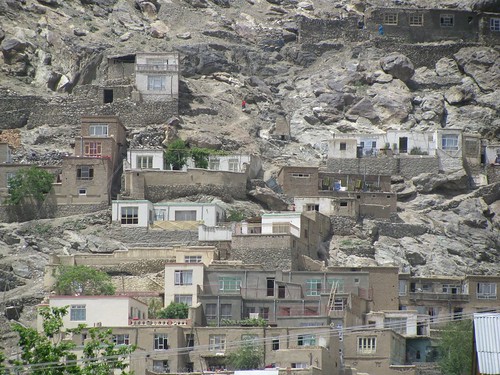Friday
Apr242009
Bridging The Cultural Divide To Fight Terrorists
By Michael Ruhl, University of New Mexico – Talk Radio News Service
According to General David Petraeus, an educated American soldier that can bridge the cultural divide with the Muslim world can more effectively fight the War on Terror. This soldier would understand the social context they are operating within, and would understand the broad implications and consequences of military action.
General Petraeus, Commander of U.S. Central Command, discussed U.S. military strategy in the Middle East and South Asia while testifying today before Congress.
“While additional military forces clearly are necessary (in Afghanistan), they will not by themselves be sufficient to achieve our objective,” said the General. America’s objective, he said, is to make sure extremists do not have a haven from which to plan and execute another attack on the level of the 9-11 attacks.
A smarter military can better understand the necessary social infrastructure to facilitate lasting peace within a region. This combined with intelligent military action, international cooperation, the building of infrastructure and a swath of other initiatives will help America secure the region, according to Petraeus. “You cannot kill or capture your way out of an industrial strength insurgency,” the General said.
"We also need to expand just the basic knowledge of Afghanistan among our forces," Petraeus said. He continued that greater knowledge will lead to a "nuanced and granular understanding" that will enable the Army to undertake the kind of sophisticated reconciliation processes in Afghanistan that were important in Iraq.
Congressman Norm Dicks (D-Wash.) agreed that soldiers should be educated, and brought attention to the U.S. Army’s Homestead Program. Dicks said this program involves an Officer taking a year off from active service to live in a country, learn the language, and understand the culture. Retired Army General John Abizaid did a program similar to this. Abizaid was former Commander of U.S. Central Command.
The U.S. Army could not be reached for comment on the current funding of the program, but Dicks expressed concern on the small number of individuals enrolled in it.
The necessary approach to success involves placing security in the hands of the Afghans, Petraeus said, which means helping them collectively realize that the biggest security threat in the region comes from dissident extremist elements within the country, most notably Al-Qaeda. He emphasized that America’s presence in Afghanistan is not permanent, and that Afghanistan’s government and economy must be encouraged by its citizens.
According to General David Petraeus, an educated American soldier that can bridge the cultural divide with the Muslim world can more effectively fight the War on Terror. This soldier would understand the social context they are operating within, and would understand the broad implications and consequences of military action.
General Petraeus, Commander of U.S. Central Command, discussed U.S. military strategy in the Middle East and South Asia while testifying today before Congress.
“While additional military forces clearly are necessary (in Afghanistan), they will not by themselves be sufficient to achieve our objective,” said the General. America’s objective, he said, is to make sure extremists do not have a haven from which to plan and execute another attack on the level of the 9-11 attacks.
A smarter military can better understand the necessary social infrastructure to facilitate lasting peace within a region. This combined with intelligent military action, international cooperation, the building of infrastructure and a swath of other initiatives will help America secure the region, according to Petraeus. “You cannot kill or capture your way out of an industrial strength insurgency,” the General said.
"We also need to expand just the basic knowledge of Afghanistan among our forces," Petraeus said. He continued that greater knowledge will lead to a "nuanced and granular understanding" that will enable the Army to undertake the kind of sophisticated reconciliation processes in Afghanistan that were important in Iraq.
Congressman Norm Dicks (D-Wash.) agreed that soldiers should be educated, and brought attention to the U.S. Army’s Homestead Program. Dicks said this program involves an Officer taking a year off from active service to live in a country, learn the language, and understand the culture. Retired Army General John Abizaid did a program similar to this. Abizaid was former Commander of U.S. Central Command.
The U.S. Army could not be reached for comment on the current funding of the program, but Dicks expressed concern on the small number of individuals enrolled in it.
The necessary approach to success involves placing security in the hands of the Afghans, Petraeus said, which means helping them collectively realize that the biggest security threat in the region comes from dissident extremist elements within the country, most notably Al-Qaeda. He emphasized that America’s presence in Afghanistan is not permanent, and that Afghanistan’s government and economy must be encouraged by its citizens.
tagged  911,
911,  Afganistan,
Afganistan,  Army Officer,
Army Officer,  CENTCOM,
CENTCOM,  Central Command,
Central Command,  Congress,
Congress,  Congressman,
Congressman,  Culture,
Culture,  General David Petraeus,
General David Petraeus,  General Jon Abizaid,
General Jon Abizaid,  Homestead Program,
Homestead Program,  Iraq,
Iraq,  John Abizaid,
John Abizaid,  Michael Ruhl,
Michael Ruhl,  Middle East,
Middle East,  Norm Dicks,
Norm Dicks,  Officer,
Officer,  Ruhl,
Ruhl,  September 11th,
September 11th,  Southia Asia,
Southia Asia,  U.S. Army,
U.S. Army,  US Central Command,
US Central Command,  United States Central Command,
United States Central Command,  afghanistan,
afghanistan,  al qaeda,
al qaeda,  army,
army,  baghdad,
baghdad,  country,
country,  david petraeus,
david petraeus,  democrat,
democrat,  education,
education,  extremism,
extremism,  extremist,
extremist,  general,
general,  kabul,
kabul,  knowledge,
knowledge,  language,
language,  michael,
michael,  michael t ruhl,
michael t ruhl,  michaeltruhl,
michaeltruhl,  regional security,
regional security,  retired,
retired,  security,
security,  war on terror,
war on terror,  washington in
washington in  Congress,
Congress,  News/Commentary,
News/Commentary,  Pentagon
Pentagon
 911,
911,  Afganistan,
Afganistan,  Army Officer,
Army Officer,  CENTCOM,
CENTCOM,  Central Command,
Central Command,  Congress,
Congress,  Congressman,
Congressman,  Culture,
Culture,  General David Petraeus,
General David Petraeus,  General Jon Abizaid,
General Jon Abizaid,  Homestead Program,
Homestead Program,  Iraq,
Iraq,  John Abizaid,
John Abizaid,  Michael Ruhl,
Michael Ruhl,  Middle East,
Middle East,  Norm Dicks,
Norm Dicks,  Officer,
Officer,  Ruhl,
Ruhl,  September 11th,
September 11th,  Southia Asia,
Southia Asia,  U.S. Army,
U.S. Army,  US Central Command,
US Central Command,  United States Central Command,
United States Central Command,  afghanistan,
afghanistan,  al qaeda,
al qaeda,  army,
army,  baghdad,
baghdad,  country,
country,  david petraeus,
david petraeus,  democrat,
democrat,  education,
education,  extremism,
extremism,  extremist,
extremist,  general,
general,  kabul,
kabul,  knowledge,
knowledge,  language,
language,  michael,
michael,  michael t ruhl,
michael t ruhl,  michaeltruhl,
michaeltruhl,  regional security,
regional security,  retired,
retired,  security,
security,  war on terror,
war on terror,  washington in
washington in  Congress,
Congress,  News/Commentary,
News/Commentary,  Pentagon
Pentagon 

















A Interesting View In A C-130 Over Afghanistan
As I get ready to fly on a C-130 from Camp Kaia in Kabul to Kandahar, I noticed a group of Afghan member preparing to come with me. There were about 20 of these men, ages 20's to 50's. They are part of the Kabul police force that has been trained by coalition forces. They are flying down to Kandahar to train their counterparts in Kandahar.
As we wait for the plane, I notice these men talking together and taking pictures as a group with a couple of American troopers. It seems a lot like a graduation photo but it has a hard edge to it. Hard to describe.
As I jump on the C-130, I am surrounded by these men. I don't mind those close proximity as it was freezing outside and the snow was beginning to pile up. As we sat down, we do so in long parallel lines faces one another, so that our knees cross back and forth and back and forth like some strange human zipper.
One requirement in every C-130 I have ever been in is body armor. We all have to be wearing it. Kevlar vest and helmut. We all have them. And none of them match. We each acquired them in their own way. Their government. Their employer. Makes me think about the Sapi plates in my vest I acquired in Israel and the vest and helmet, Gosh know where. . .
As I look down the line of these men, intermixed with the occasional trooper from around the world, it occurs to me just how strange this group of men, me included, really are.